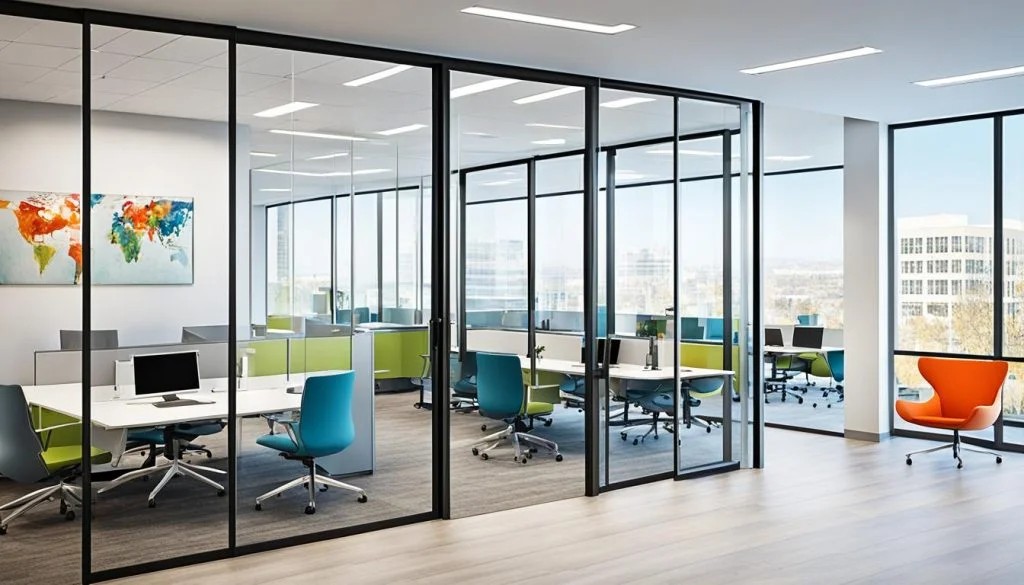In the competitive business environment of today, a good and interesting workplace is very vital. Companies are continually seeking fresh approaches to raise employee privacy, collaboration, and well-being. One often used architectural innovation are sliding glass cubicles. These adaptable areas combine openness and isolation to provide a balance between concentrated, private work and group engagement. Glass transparency and visibility help to promote team cooperation and understanding. The sliding mechanism offers instant seclusion when concentration is vital, therefore removing distractions and promoting intense work. This adaptability lets employees personalize their workstation, therefore enhancing the working conditions. By giving shared and private areas, sliding glass cubicles improve productivity, employee satisfaction, and provide a more dynamic and responsive workplace. The workstation encourages group projects and personal focus.
Openness encourages cooperation and communication
Because they promote collaboration and communication, open-plan workplaces are very common. Complete lack of privacy, however, may cause distraction, reduce employee satisfaction, and diminish attention span. Retaining visual connectivity and enabling autonomous workstations, sliding glass cubicles help to tackle this issue. Glass lets the natural light into the office, therefore enhancing and motivating interaction. Clear sight of each other by staff members fosters bonding and spontaneous encounters. Visual access helps to simplify information sharing and problem-solving. Changing lengthy emails with a glance might help to develop more responsive and agile working environments. Shared visibility also raises team openness, accountability, and trust. Visibility encourages teamwork and workplace involvement, therefore enhancing creativity and output.
Demand Privacy: Personal Focus Areas
The modern workplace calls for a careful mix of uniqueness and cooperation. Workers have to often alternate between concentrated work and brainstorming. Here the innovative sliding mechanism of glass cubicles comes in handy. Though the constant activity may divert attention from concentrated operations, open-plan offices promote cooperation and teamwork. An appealing alternative are sliding glass booths, which provide quick solitude. Employees could close the glass panels to create a quiet, dedicated space while working on a challenging project or meeting a deadline. The plenty of solitude shields against working distractions including colleagues, noise, and others.
Aesthetics and Worker Welfare
Apart from its practical advantages, sliding glass cubicles enhance workplace appearance. The modern, clean look lends professionalism and grace, therefore creating a friendly environment. Glass transparency and natural light provide a better, more energizing atmosphere, therefore reducing synthetic lighting and promoting a better workplace. This focus on appearance may influence worker welfare and morale. Visually appealing offices boost worker happiness, lower stress, and inspire innovation. Studies show that well-designed offices increase involvement and output. By customizing their workspace behind the glass panels, employees may display their individuality and foster a nice and motivating environment. Sliding glass cubicles’ beauty and practicality help to increase employee well-being and job satisfaction.
Suggestions for implementation: optimizing advantages
Sliding glass cubicles need planning and care. The needs of the firm and teams should guide cubicle layout and size. Comfort and prevention of overcrowding depend on space between cubicles. Too important are acoustics. While sound-absorbing panels or ceiling tiles may help to reduce noise pollution, glass panels minimise sounds. Design and execution staff involvement is really vital. Employee feedback might enable the design of cubicles meeting their needs. At last, clear sliding panel use guidelines should be developed to strike a compromise between privacy and teamwork. By carefully resolving these implementation issues, organizations may use sliding glass cubicle benefits and provide a very efficient working environment.


